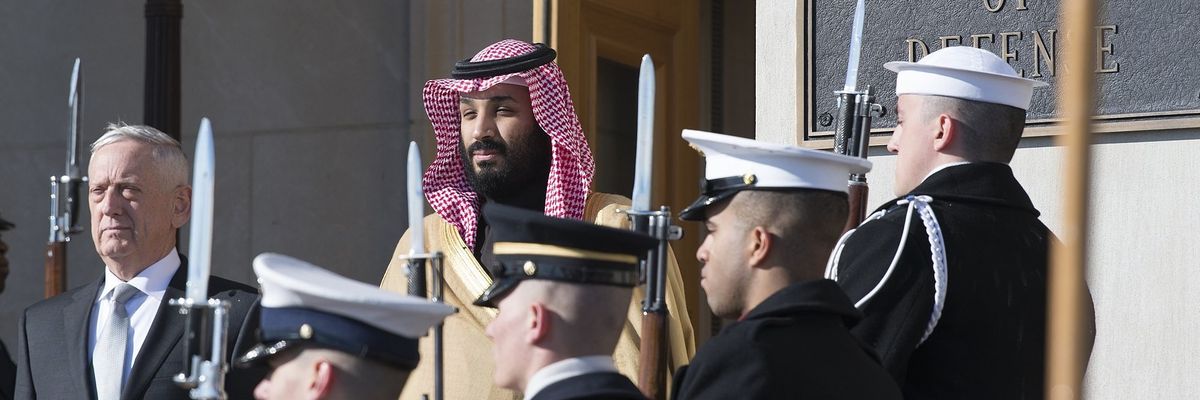Hundreds of U.S. veterans, including former generals and other high-ranking officers, are cashing in on their government experience by working for foreign countries, according to a pair of explosive investigations from the Project on Government Oversight and the Washington Post.
The vast majority of former service members implicated in the investigations have worked for countries in the Middle East, where the U.S. military has taken part in a series of wars in recent decades.
Most of those have worked for military contractors in the United Arab Emirates, a country with a dismal human rights record both at home and abroad. The U.S. presence in the UAE is so significant that the Post called it a “military machine guided by Americans.” Notably, retired Marine Gen. Jim Mattis served as a military adviser to the UAE in 2015 before returning to government two years later as secretary of defense.
And 15 former generals and admirals have worked directly for Saudi Crown Prince and Defense Minister Mohamed Bin Salman, who launched, and has since led, his country’s brutal war in Yemen.
Retired Marine General James L. Jones, who served as President Barack Obama’s national security adviser, started working with MbS in 2017, when the Saudi government enlisted Jones to “conduct an organizational assessment” of the country’s military. For the project, the former general enlisted the help of “about a dozen former senior Pentagon officials, including William S. Cohen, who served as secretary of defense in the Clinton administration,” according to the Post.
The news raises serious questions about how secondary considerations — like getting a cushy job after retirement — could affect the decision-making process of America’s military leadership. After all, base pay for even the nation’s top generals is around $200,000 per year, and many have made far more than that in the service of foreign governments.
As the Post noted, some officers “even negotiated jobs with foreign governments while they were still on active duty,” and others are working in countries where they were stationed while on active duty.
The investigations stem from a trove of documents that POGO and the Post acquired from the Pentagon in a pair of lawsuits.
Given that former soldiers and officers can be called back to active service at any time, they are not allowed to receive anything of value from a foreign government, like all current U.S. officials. But in 1977, Congress granted the Pentagon and State Department the ability to issue waivers for that rule; those documents make up much of the dossiers acquired in the investigation.
Many of the forms are heavily redacted, and POGO and the Post continue to push the government for more complete information.
Though the executive branch can reject requests for waivers for numerous reasons, 95 percent of them have been approved since 2015, implying that the process is little more than a rubber stamp. And the Post found “scores of retirees on LinkedIn who say they have taken military contracting jobs in the Persian Gulf, but for whom there is no record of federal approval,” meaning that many veterans simply don’t take the time to ask permission. In other words, the actual scale of the problem remains hard to quantify.
In total, the documents reveal that veterans have been authorized to work for at least 50 foreign governments. In addition to countries in the Middle East, this includes Singapore, Indonesia, the United Kingdom, Georgia, Djibouti, and Australia.
Furthermore, this would mean that retired officers would be picking up six- or seven-figure salaries overseas while earning lucrative taxpayer-funded pensions back home. A four-star general with over 40-years of service in the military, for example, would be expected to receive more than $230,000 a year in retirement pay, plus health care benefits.
Notably, U.S. defense contractors have also become more enmeshed in the military-industrial complex of foreign countries. As the Post notes, Northrop Grumman has opened a joint venture called Vinnell Arabia LLC with Saudi firm Arab Builders for Trading. Vinnell employs “hundreds of Americans” tasked with training the Saudi national guard, according to the Post.
The revelations add to concerns about the extent to which foreign countries, including many with authoritarian governments, have expanded their influence over U.S. institutions.
Just last month, Responsible Statecraft reported that former Sen. Norm Coleman, a leading Republican fundraiser, currently works as a paid lobbyist for Saudi Arabia. And another recent RS investigation found that dozens of former officials, including numerous ex-members of Congress, have become lobbyists for Middle East autocracies, including Saudi Arabia, the UAE, Qatar, Bahrain, and Egypt.
Moreover, Retired four-star Marine general John R. Allen stepped down as head of the Brookings Institution in June after news broke that federal authorities believe Allen illegally lobbied for Qatar.
In order to address these problems, some members of Congress have introduced a new piece of legislation known as the Fighting Foreign Influence Act. If passed, the bill would force think tanks and other tax-exempt organizations to disclose major gifts from foreign governments. It would also “impose a lifetime ban on former senior U.S. military officers, presidents, vice presidents, other senior executive branch officials, and members of Congress from ever lobbying for a foreign principal,” according to a press release from the proposal’s sponsors.
However, the bill would not prevent the behavior revealed in the new investigations given that this work does not include lobbying for a foreign principal.
















